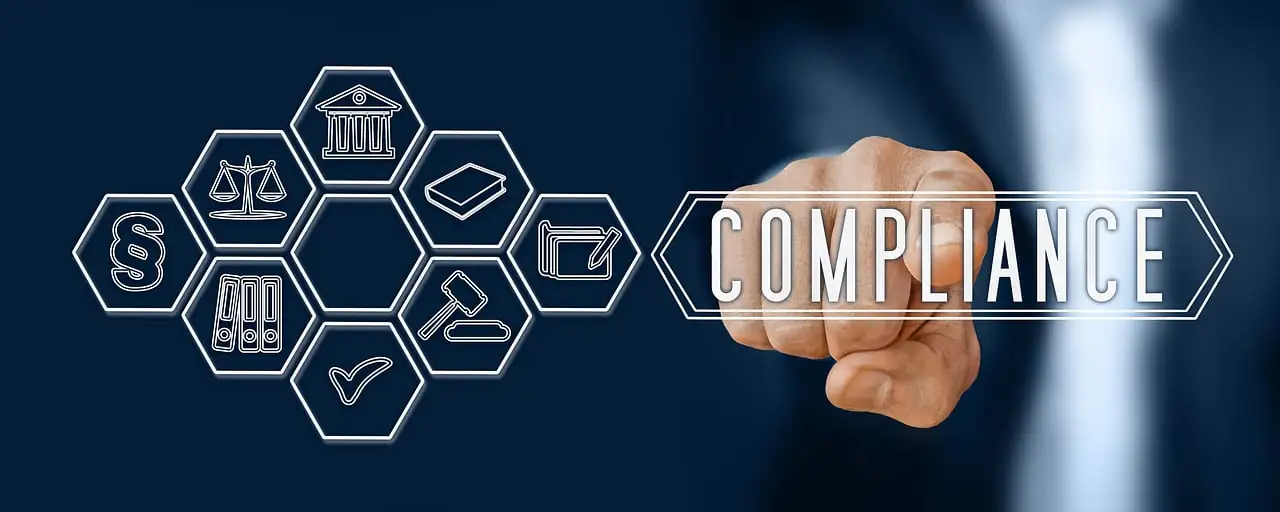
Sales Compliance Considerations for Sales Teams
Salespeople thrive in a high-speed setting, where relationships are forged, deals are closed, and revenue is generated. In such a fast-paced environment, it’s easy to get swept up in the excitement and overlook a critical aspect that underpins the entire process — compliance.
While it might not be the most exciting topic on a sales team’s agenda, sales compliance is a cornerstone of ethical business practices, ensuring the protection of both your team and your customers.
This article delves deeper into the nuances of sales compliance, exploring its significance, benefits, and practical strategies for ensuring compliance across a variety of sales channels.
Understanding Sales Compliance
At its core, sales compliance involves adhering to a set of rules and regulations that govern the way sales teams interact with customers and conduct business operations. These regulations can vary depending on factors such as industry, location, and the type of data being handled.
Essentially, sales compliance is about maintaining transparency, accuracy, and ethical conduct throughout the entire sales process.
Why Sales Compliance Matters
The importance of sales compliance cannot be overstated. Not only does it keep your business on the right side of the law, but it also builds trust with customers.
With data breaches and privacy concerns being front-page news, customers are increasingly cautious about sharing their personal information. That’s why it’s important to demonstrate a commitment to compliance so you can alleviate these concerns and create an environment of trust.
Moreover, non-compliance can result in severe consequences, ranging from financial penalties to reputational damage.
In highly regulated industries such as healthcare and finance, failing to comply with regulations can lead to legal action, fines, and even the revocation of licenses to operate.
Benefits of Sales Compliance
Sales compliance goes beyond a mere legal obligation — it offers a range of benefits that can enhance your business’s reputation, minimize risks, provide a competitive advantage, and foster customer loyalty. Let’s delve into each of these advantages in detail:
1. Enhanced Reputation
Maintaining compliance with regulations showcases your commitment to ethical practices and responsible data handling. In an age where privacy concerns and data breaches are prevalent, customers are increasingly cautious about sharing their personal information.
When customers see that your company takes compliance seriously, they are more likely to trust your brand with their sensitive data. This enhanced reputation can lead to positive word-of-mouth recommendations, improved customer satisfaction, and increased customer acquisition.
2. Reduced Risk
One of the key aspects of compliance is regular assessment and monitoring. This process helps identify potential risks and vulnerabilities within your sales operations. It helps you prevent compliance breaches, data breaches, and other mishaps that could harm your business.
Regular compliance assessments not only reduce the likelihood of negative outcomes but also demonstrate your commitment to maintaining a secure and reliable sales process.
3. Competitive Advantage
In today’s highly competitive business landscape, standing out from the crowd is essential. Compliance can be a unique selling proposition (USP) that sets your business apart. When potential customers are comparing different providers, a strong compliance record can tip the scales in your favor.
Highlighting your dedication to ethical conduct and data protection can resonate with customers who prioritize these factors, giving you a significant edge over competitors who may not prioritize compliance.
4. Customer Loyalty
Building and retaining customer loyalty is a cornerstone of long-term business success. When customers are confident that their personal information is being handled responsibly and transparently, they are more likely to become loyal advocates for your brand.
Safeguarding customer data and respecting their privacy creates a positive customer experience that encourages repeat business and referrals. Customer loyalty not only boosts sales but also contributes to a strong brand presence in the market.
5. Positive Brand Image
Sales compliance contributes to crafting a positive brand image that aligns with modern values and expectations. A brand that prioritizes compliance demonstrates a commitment to integrity, transparency, and customer well-being.
The positive brand image resonates with customers and stakeholders, leading to better relationships and a lasting positive impact on your business’s reputation.
6. Trustworthiness in Industry
In industries that handle sensitive information or operate in highly regulated sectors such as finance, healthcare, and technology, compliance is a hallmark of trustworthiness.
Demonstrating adherence to regulations and industry standards will position your business as a reliable partner that takes its responsibilities seriously. In return, you’ll be able to build stronger partnerships, collaborations, and opportunities for growth within your industry.
Strategies for Ensuring Sales Compliance: Building a Foundation of Ethical Practice
Sales compliance is not a one-time task — it’s an ongoing commitment to ethical business practices.
To ensure that your sales team operates within the bounds of regulations while maintaining transparency and customer trust, consider implementing the following strategies:
1. Informed Consent
Obtaining explicit consent from customers is the cornerstone of ethical data handling. When you’re collecting personal data, you should clearly communicate the purpose for which it will be used. Communication should be transparent, concise, and easily understandable.
Make sure to allow customers to make an informed decision by providing them with all the necessary information. It’s especially important to give customers the option to withdraw their consent at any time — this empowers individuals to have control over their data and demonstrates your respect for their privacy.
2. Implement Comprehensive Privacy Policies
Developing detailed and comprehensive privacy policies is vital for compliance. These policies should outline how customer data is collected, stored, used, and shared. You should make them easily accessible to both customers and employees on your website and other relevant platforms.
Privacy policies should be written in clear language, avoiding legal jargon, and should be regularly reviewed and updated to reflect any changes in regulations or company practices.
3. Robust Data Archiving
Maintaining accurate records of sales communications is another essential aspect of compliance and risk management. Implement robust cloud archiving solutions, particularly for email communications. These solutions automatically retain and organize email correspondence, ensuring compliance with data retention regulations.
In addition to regulatory compliance, efficient data archiving can help your sales team retrieve important communications when needed, improving overall operational efficiency.
4. Limited Data Sharing
When sharing customer data, follow the principle of least privilege — share only the information that is necessary for a specific purpose.
You should make sure that customers provide explicit consent before their data is shared, especially with third parties. Also, always prioritize security by encrypting sensitive data during transmission and storage.
Keep in mind — when forming partnerships with third parties, ensure that their data handling practices align with your privacy policies to prevent unintentional breaches.
5. Employee Training
A well-informed sales team is essential for maintaining compliance. Regularly educate your sales staff about privacy laws, data handling procedures, and compliance requirements.
Make sure they understand the significance of ethical data handling and the potential consequences of non-compliance. Training should cover topics such as obtaining consent, secure data storage, communication protocols, and recognizing and responding to compliance issues.
6. Continuous Policy Updates
Privacy regulations and industry standards are dynamic and ever-changing. That’s why you should regularly review and update your privacy policies to stay in line with these changes. Communicate policy updates to your team and customers, showing your commitment to compliance and transparency.
Additionally, ensure that your sales team is aware of these policy changes and their implications so they can adjust their practices accordingly.
7. Proactive Monitoring and Auditing
You should also implement proactive monitoring and auditing processes to ensure that your sales team adheres to compliance protocols. Regularly review data handling practices, communication records, and consent management to identify any potential breaches.
When you catch and rectify compliance issues early, you can mitigate risks and maintain a strong ethical foundation.
Leveraging Technology for Compliance
In the modern digital landscape, technology assumes a pivotal role in upholding sales compliance. It offers a range of tools and solutions that contribute to the maintenance of ethical and regulatory standards.
Here are some ways in which technology can be harnessed to ensure sales compliance:
Automation. Incorporating automation tools into your compliance strategy can yield significant benefits. These tools are designed to streamline compliance efforts, ensuring that your sales operations align with regulations. Automated email archiving systems, consent management platforms, and CRM software equipped with compliance features can assist in maintaining accuracy and consistency in the handling of customer data. Automating these processes can help you reduce the likelihood of human error and create a standardized approach to compliance across your sales team.
Data Security Solutions. The protection of customer data is a fundamental aspect of compliance. To safeguard sensitive information from breaches and unauthorized access, it’s crucial to implement robust cybersecurity measures. Establishing secure data storage practices backed by regular security audits forms a comprehensive data security framework. Moreover, having strong data security measures in place helps you create a solid foundation for maintaining compliance and fostering customer trust.
Monitoring Tools. Technology provides sophisticated monitoring tools that empower you to keep a vigilant eye on your sales communications across various channels. These tools serve as a proactive defense mechanism, allowing you to track interactions and identify potential compliance violations. By analyzing sales communications, these monitoring tools can promptly flag any deviations from established compliance protocols. This early detection enables you to take swift corrective actions, mitigating risks and preventing potential breaches.
Over to You
Sales compliance might not be the most glamorous aspect of sales, but it’s a fundamental component of responsible and ethical business practices. By prioritizing compliance, businesses can establish trust with customers, avoid legal repercussions, and foster a positive brand image.
Implementing clear policies, keeping meticulous records, and leveraging technology to automate compliance processes can help sales teams navigate the complex regulatory landscape and achieve their sales goals without compromising on ethical standards.
Remember, in the ever-evolving world of sales, staying compliant is not just a requirement; it’s a key to sustainable success.





